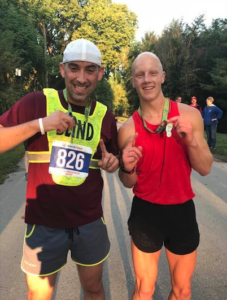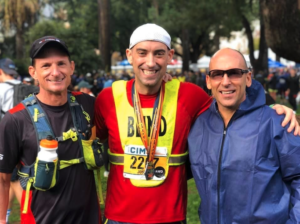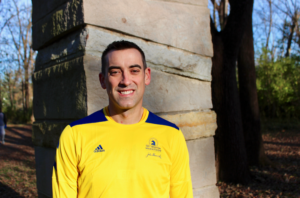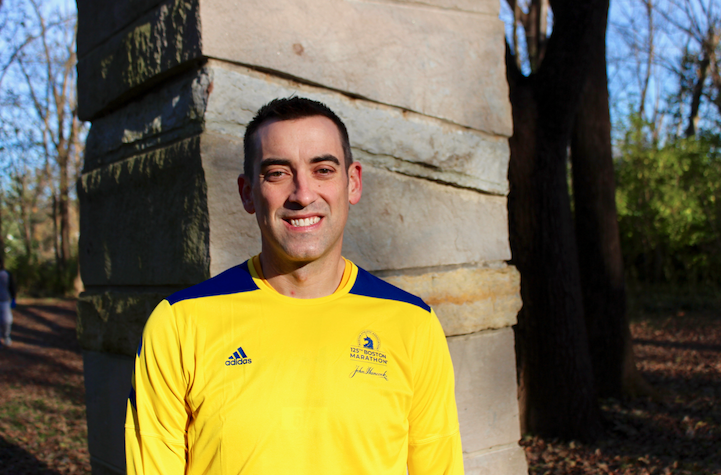St. Matthews Resident Finishes 2nd In Boston Marathon’s Visual Impairment Division
Writer / Gavin LaPaille
Photography Provided
 St. Mathews resident Joe Burket wasn’t sure if he would make it to Boston.
St. Mathews resident Joe Burket wasn’t sure if he would make it to Boston.
After qualifying in the visual impairment division for the Boston Marathon at the U.S. Association of Blind Athletes National Championships, Burket was set to make his debut at the world’s oldest marathon in October of 2021. After a series of events impacted both his travel and running plans, doubt began to seep into Burket’s mind regarding whether he would actually run the race.
Originally planning to take a Southwest flight with his wife and two children, Burket and his family were sitting at the gate when their flight was one of many canceled by the airline. That left Burket scrambling to find a replacement. He did, but only for himself, forcing him to fly solo with a long layover just to get to Boston. After landing, his fortunes seemingly turned for the better, as the Massachusetts Association for the Blind and Visually Impaired staff arranged for someone to meet Burket at the airport and transport him to his hotel, while his family was able to find another flight into Boston the following day.
After arriving, Burket got another piece of bad news. One of the two guides set to help Burket navigate the 26.2-mile course had broken his toe and would be unable to run. Thankfully, his remaining guide found a willing replacement in the area, and Burket could finally focus on the race.
Burket finished the marathon in a time of 3:18:23 and placed second in the men’s vision impairment division, earning $750 for his performance. He said the time wasn’t what he had hoped, but was proud of the way he finished the race.
“I was hoping to break 3:15, but I had the travel issues and I wasn’t eating great,” Burket says. “I got to about mile 15 and had the feeling this isn’t my day. The last five miles turned into survival mode towards the finish. I knew I was in second place at that point in the blind division so I just changed my strategy, stayed calm and held it together. It wasn’t my best race, but it was Boston. It’s not supposed to be an easy race.”
This year’s Boston Marathon was the first major marathon to offer a visual impairment division with prize money, making the event even more special for Burket. With the new division, Burket and his fellow competitors were sent out onto the course earlier than the rest of the field, giving him a unique feeling of running the race without the typical crowd of runners.

“It was wonderful,” Burket says. “They treat us kind of like the VIP runners. We had our names on the bibs like the professionals. On the front of my shirt it said ‘Joseph’ on it. The whole race they’re yelling my name, ‘Go Joseph – you’re looking good Joseph.’ They’re actually calling me by name and it was a really unique experience.”
Burket, 39, hasn’t always been blind. He was diagnosed with a rare condition known as Leber hereditary optic neuropathy in 2012 that caused him to begin losing his sight. It wasn’t long after discovering the condition that he was legally blind.
A 2000 graduate of Trinity High School and a member of the cross-country team, Burket had been what he calls a “fair-weathered” runner when he was younger. He started getting more serious about the sport once he lost his vision, and says he is a better runner now than when he was sighted. His longtime familiarity with St. Mathews is a big advantage as he trains throughout the community.
“I don’t have central vision but I have peripheral so my orientation mobility is decent,” Burket says. “I usually meet up with runners a few days a week and run with them. Any other runs I need to do, I’ve been in St. Mathews for close to 20 years and I have that map in my head of where I want to go.”
Locally, Burket enjoys running the track at Waggener High School, Norbourne Estates, Macon Avenue and Seneca Park. When he is in marathon training he runs five to six days per week and 45 to 55 miles, receiving help from the community along the way.
“It’s just trying to work that in, between work and family,” Burket says of his training. “It’s another part-time job. I have a wife that is understanding, grandparents that are willing to help out and I have the luxury of nice neighbors. My parents are close to St. Mathews and my dad will drive me to Seneca Park so I can meet up with others to run. It’s an individual sport but it’s a full team of people that got me to Boston.”
While Burket usually runs with guides in races, he does run by himself while training or with a local group of runners. He credits them for teaching him how to be a better runner when he was first getting serious about the sport, and helping him comfortably get miles in.
“I got a lot faster chasing these guys around,” Burket says. “They are much more experienced and smarter runners than me. A lot of times what I have to do is piecemeal a run. If I have to speed up I find a comfortable straight shot where I can run ahead, turn around and run back to them, and they’ll help me put together a run where I need guides and where I’m comfortable running by myself.”
 When he isn’t running, Burket works for the Department of Veterans Affairs assisting with disability compensation. A college baseball player at Bellarmine University, Burket has tried other sports geared towards the visually impaired such as goalball and beep baseball, but enjoys running the most.
When he isn’t running, Burket works for the Department of Veterans Affairs assisting with disability compensation. A college baseball player at Bellarmine University, Burket has tried other sports geared towards the visually impaired such as goalball and beep baseball, but enjoys running the most.
“Running is such an individual sport,” Burket says. “If I can find the time and someone to help me, I can just pick up and go. I just need a pair of running shoes and a clear road to run on. I can do it whenever, wherever. It’s something I feel really comfortable doing. When I’m running with other people it clears my mind and it’s a nice moment of freedom. It’s one of the freest moments of my life of just not worrying.”
Burket has a few races planned in the near future. He has committed to the U.S. Association of Blind Athletes National Championships in 2022. Burket will also compete in the Urban Bourbon Half Marathon in 2022, the site of his first half marathon in 2012, with Boston in 2022 on his radar as well.
“I keep finding a new goal – just challenging myself to be better,” he says. “I have reached new levels I didn’t think I’d hit, just a little bit at a time.”
Burket says doesn’t want to be defined by his disability.
“It’s really cool being the second-fastest blind runner at the Boston Marathon but I still compare myself to other runners,” Burket says. “I don’t want to just beat other blind people, I want to beat everyone. I don’t want to be known as the blind runner. I want to be the runner who happens to be blind.”






